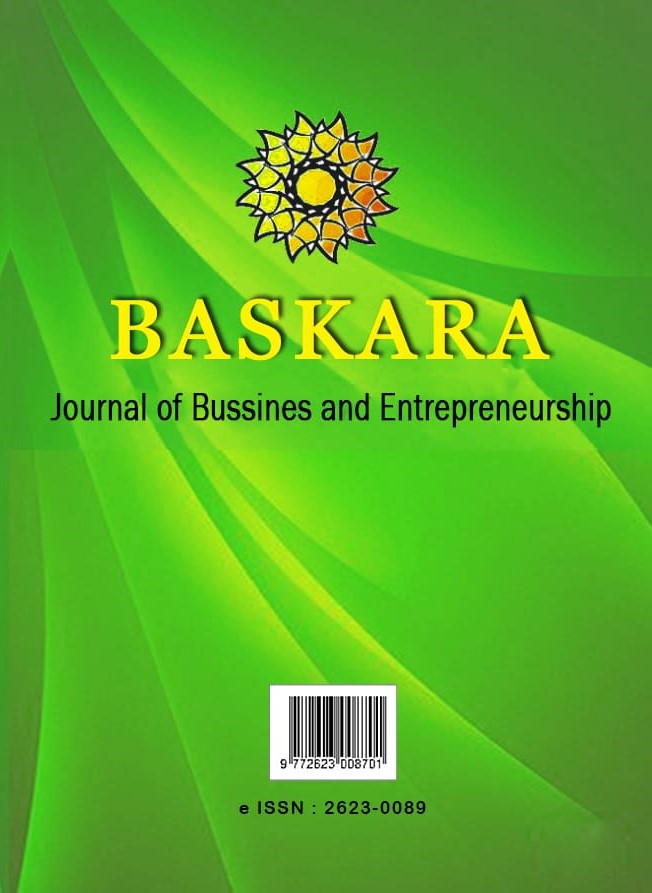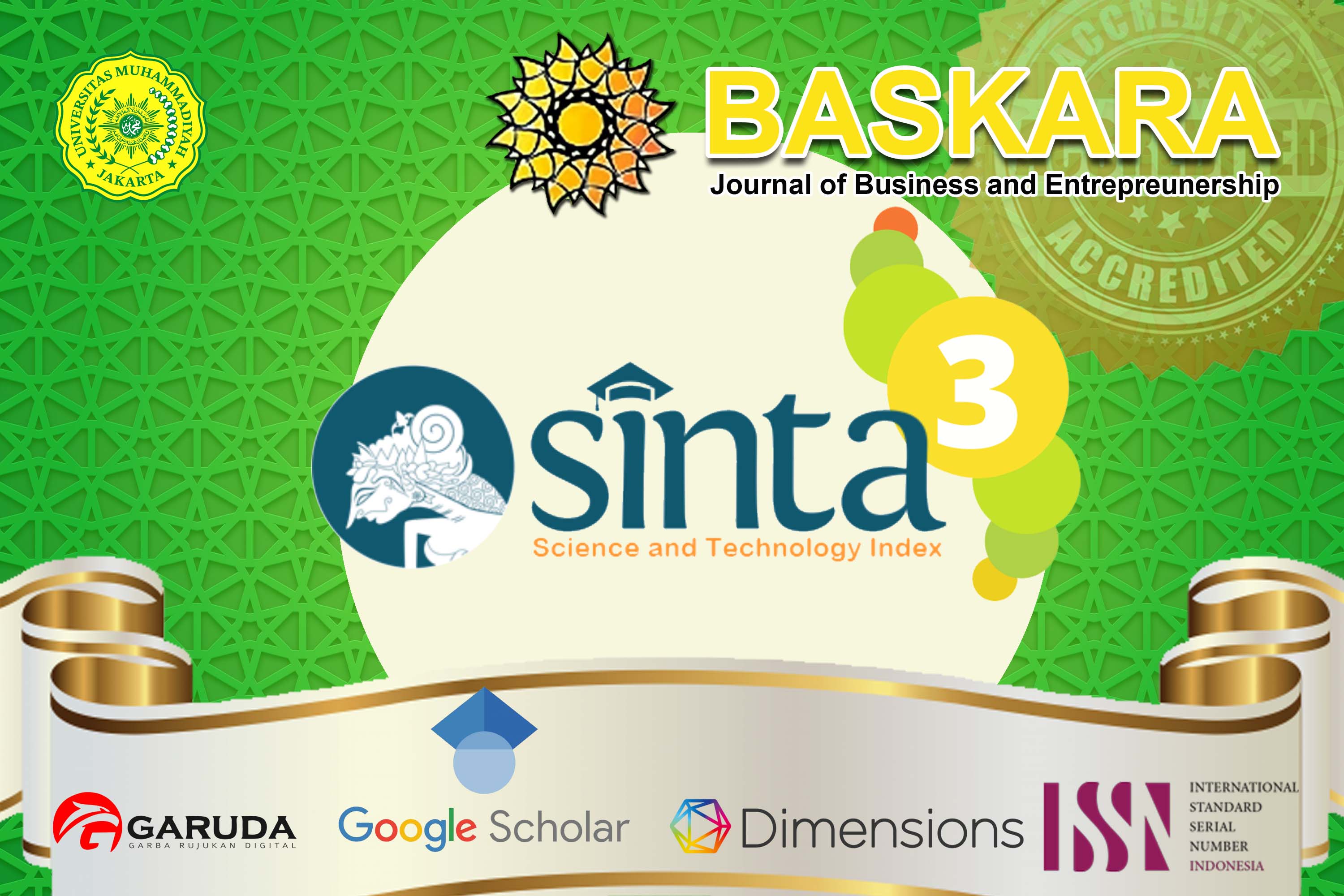Women’s Social Enterprise Organizational Performance Analysis: A Road to Sustainability
DOI:
https://doi.org/10.54268/baskara.v5i2.14116Keywords:
Gender, McKinsey 7S Model, Social EntrepreneurshipAbstract
With a high sense of empathy and sociality, women tend to engage in social entrepreneurship or participate in social activities to pursue not only profit but also social impact. In addition, social entrepreneurship has been believed to be able to address social problems and be the best way to build economic resilience and independence in societies. Through extensive research, social enterprises have proven to be providers of solutions to social problems. Therefore, ensuring the success and sustainability of social enterprises is a major challenge for female entrepreneurs. The aim of this study is to identify the current conditions of social entrepreneurship and the challenges they face to ensure their sustainability from a comprehensive management perspective. The research applies a qualitative research approach with several case study designs. Data obtained through observations and semistructured interviews with four CEOs and ten employees was processed and analyzed using McKinsey’s 7S model approach to determine the company’s current organizational performance. Performance analysis using McKinsey 7S Models at KWN Fatimah Az-Zahrah, Celebes Mushroom Farms, Café Tulus, and Café Mella House of Donuts has provided an illustration of their current condition and found that the three elements are not aligned with each other, mainly the elements strategy, system, and skills, and the two elements have gaps in the system and skills. These unbalanced elements and gaps will hinder these companies from achieving efficient performance and sustainability.References
A’zam, M. N., Dila, J. S., Arifi, Y., & Husna, A. N. (2021). Studi Literatur: Motivasi Wirausaha
Sosial di Masa Pandemi Covid-19. Urecol Journal. Part H: Social, Art, and Humanities,
(1), 27–31. https://doi.org/10.53017/ujsah.49
Anggadwita, G., & Dhewanto, W. (2015). Women’s Entrepreneurial intentions in micro and
small enterprises (MSEs) in Indonesia: The influence of environmental factors on
perceived behavioral control. Journal of Administrative and Business Studies, 1(1), 1–7.
https://doi.org/10.20474/jabs-1.1.1
Arokiasamy, A. R. A. (2012). The influence of globalization in promoting entrepreneurship in
Malaysia. South East European Journal of Economics and Business, 7(2), 149–157.
https://doi.org/10.2478/v10033-012-0021-7
Banke-Thomas, A. O., Madaj, B., Charles, A., & Van Den Broek, N. (2015). Social Return on
Investment (SROI) methodology to account for value for money of public health
interventions: A systematic review. BMC Public Health, 15(1), 1–14.
https://doi.org/10.1186/s12889-015-1935-7
Hardiansyah, H. (2012). Metodologi Penelitian Kualitatif. Salemba.
Herlianaa, Sri; Dhewanto, Wawan; Anggadwita, G. (2014). Competitiveness Strategy Analysis
of Women Entrepreneurs: A Case Study of SMEs in Indonesia. The 6th Indonesia
International Conference on Innovation, Entrepreneurship and Small Business, 6, 155–
Indra Dewi, S., Qorib, F., Kartini, R., & Abdul Ghofur, M. (2021). The 4 th LSPR International
Conference on Communication and Business 2021 Women and Pandemic: the power
within social entrepreneurship. https://ssrn.com/abstract=3867098
Kemenkeu. (2021). Ini Kontribusi Perempuan dalam Ekonomi Nasional. Kementerian
Keuangan Republik Indonesia.
Kickul, J., & Lyons, T. S. (2020). Understanding Social Entrepreneurship The Relentless Pursuit
of Mission in an Ever Changing World. Routledge.
https://doi.org/https://doi.org/10.4324/9780429270406
Jaenudin, J., & Verawati, E. (2022). Service Quality Impact on Customer Satisfaction of
Multipurpose Loan Products. BASKARA: Journal of Business and Entrepreneurship, 5(1),
-94.
Komarsyah, D., Aprilia, H. D., Efendi, N., & Aprilani, D. (2019). Diagnosis Efektivitas Organisasi
Model 7S Mckinsey. Jurnal Prespektif Bisnis, 2, Nomor 1(P-ISSN: 2338-1115), 19–27.
Lisetchi, M., & Brancu, L. (2014). The Entrepreneurship Concept as a Subject of Social
Innovation. Procedia Social and Behaviour Sciences, 124, 87–92.
https://doi.org/10.1016/j.sbspro.2014.02.463
Putri, A. D., & Ghazali, A. (2021). Analysis of Company Capability Using 7S Mckinsey
Framework To Support Corporate Succession ( Case Study : Pt X Indonesia ).
Manajemen Bisnis, 11(1), 45–53. https://doi.org/10.22219/mb.v11i1.
Saragih, R., & Elisabeth, D. (2020). Kewirausahaan Sosial Dibalik Pandemi Covid-19:
Penelusuran Profil Dan Strategi Bertahan. Jurnla Manajemen, 6(1), 47–56.
Sofia, I. P. (2015). Konstruksi Model Kewirausahaan Sosial (Social Entrepreneurship) sebagai
Gagasan Inovasi Sosial bagi Pembangunan Perekonomian. Jurnal Universitas
Pembangunan Jaya.
Thompson, J., & Doherty, B. (2006). The diverse world of social enterprise:A collection of
social enterprise stories. International Journal of Social Economics, 33(5–6), 361–375.
https://doi.org/10.1108/03068290610660643
Verner, J. M., & Abdullah, L. M. (2012). Exploratory case study research: Outsourced project
failure. Information and Software Technology, 54(8), 866–886.
https://doi.org/10.1016/j.infsof.2011.11.001
Downloads
Published
Issue
Section
License
In order for Baskara: Journal of Business and Entrepreneurship to publish and disseminate research articles, we need publishing rights (transfered from author(s) to publisher). This is determined by a publishing agreement between the Author(s) and Baskara Journal. This agreement deals with the transfer or license of the copyright of publishing to Baskara: Journal of Business and Entrepreneurship, while Authors still retain significant rights to use and share their own published articles. Baskara : Journal of Business and Entrepreneurship supports the need for authors to share, disseminate and maximize the impact of their research and these rights, in any databases.
As a journal Author, you have rights for a large range of uses of your article, including use by your employing institute or company. These Author rights can be exercised without the need to obtain specific permission. Authors publishing in Baskara : Journal of Business and Entrepreneurship have wide rights to use their works for teaching and scholarly purposes without needing to seek permission, including:
- use for classroom teaching by Author or Author's institution and presentation at a meeting or conference and distributing copies to attendees;
- use for internal training by author's company;
- distribution to colleagues for their reseearch use;
- use in a subsequent compilation of the author's works;
- inclusion in a thesis or dissertation;
- reuse of portions or extracts from the article in other works (with full acknowledgement of final article);
- preparation of derivative works (other than commercial purposes) (with full acknowledgement of final article);
- voluntary posting on open web sites operated by author or author’s institution for scholarly purposes.
Copyright Transfer Agreement for Publishing (Publishing Right)
The Authors who submit manuscript has to understand that if accepted for publication, mean that all copyright and publishing right of the article shall be assigned/transferred to Baskara: Journal of Business and Entrepreneurship as assigned publisher.
- CC BY-NC: This license allows reusers to distribute, remix, adapt, and build upon the material in any medium or format for noncommercial purposes only, and only so long as attribution is given to the creator.
It includes the following elements:
BY ![]() – Credit must be given to the creator
– Credit must be given to the creator
NC ![]() – Only noncommercial uses of the work are permitted
– Only noncommercial uses of the work are permitted
Baskara (C) Copyright (2022):
BASKARA: Journal of Business and Entrepreneurship by https://jurnal.umj.ac.id/index.php/baskara
is licensed under a Creative Commons Attribution-NonCommercial 4.0 International License








